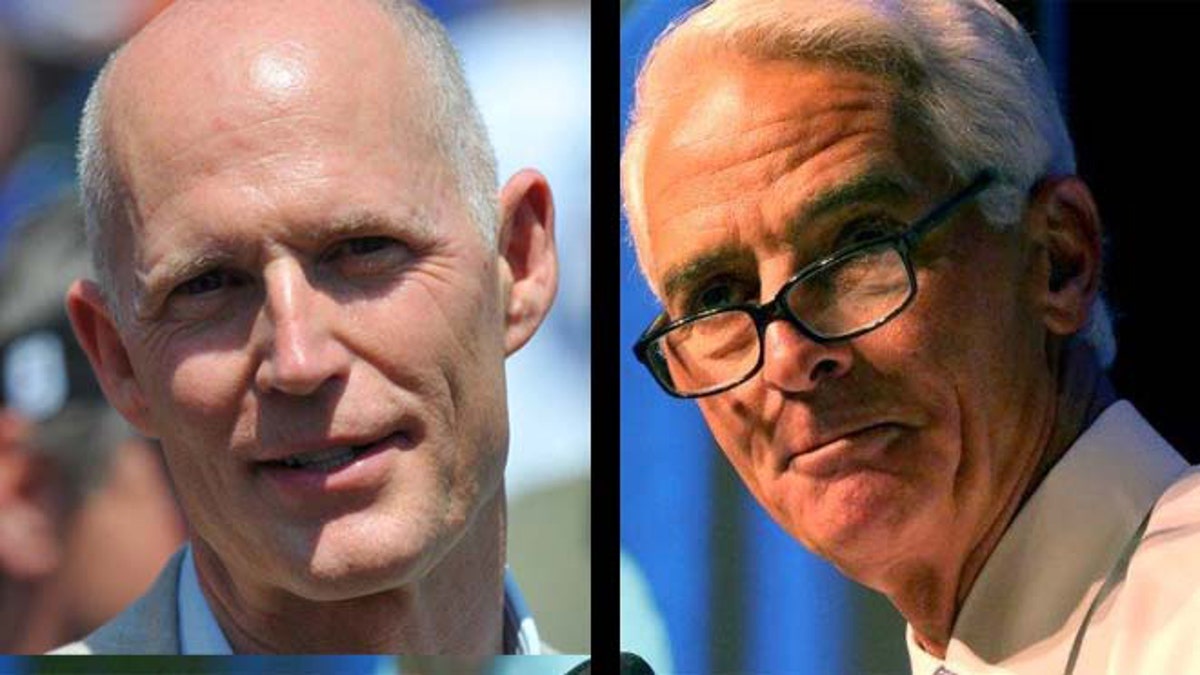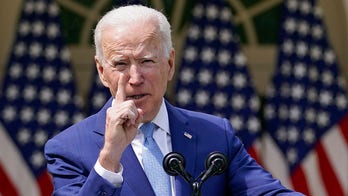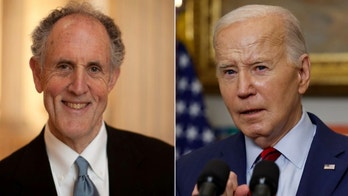
Florida Gov. Rick Scott, Republican, left; Democratic challenger Charlie Crist, right (Getty Images)
The question among political observers was this: Could former Florida Gov. Charlie Crist hold his own on the court after being out of the game for a while?
The answer came with a thunderbolt in Tuesday’s Democratic primary, where Crist not only held his own, but won with a memorable slam dunk.
Crist, who was a Republican when he was governor from 2007 to 2011, handily beat former state Sen. Nan Rich and will challenge GOP Gov. Rick Scott in November.
Scott coasted in his own primary toward a general election matching the state's last two Republican governors. It's a contest that's already been brutally negative with Scott spending millions on ads attacking Crist since he announced in November that he was seeking his old job with his new party.
"I've been their governor before, I've been their attorney general, their commissioner of education, a state senator from Tampa Bay. We have a relationship.
"It's unbelievable! What is it, $30 million in trash talk? Oh my gosh!" Crist said after he was declared the primary winner. "Floridians are smart and fortunately we know each other. I've been their governor before, I've been their attorney general, their commissioner of education, a state senator from Tampa Bay. We have a relationship and this new guy who came in from Texas a few years ago is trying to say things about me that aren't true."
Nearly 1.7 million Latinos were registered to vote in Florida in 2012, according to Pew Hispanic Research, accounting for about 14 percent of the state’s roughly 12 million “active registered voters.”
As recently as 2006, more Latinos in Florida were registered as Republicans than Democrats, but that changed in 2008. Among Latino registered voters, 476,000 were registered as Republicans in 2012, compared to 645,000 who registered as Democrats.
Florida was one of four states that chose candidates Tuesday for statewide office.
In Arizona, State Treasurer and former CEO Doug Ducey won the Republican gubernatorial primary, riding to victory with a campaign that focused on his blend of government and business experience in serving as a state official and building an ice cream company into a national brand.
The race to replace Arizona Gov. Jan Brewer, a Republican, began as a fairly quiet contest focused on health care and jobs before shifting abruptly when thousands of immigrant children began pouring into the country and some settled in the state.
In the quest for right-leaning Republican primary voters, the six candidates quickly staked out hard-line positions on immigration and repeatedly attacked the Obama administration for failing to secure the border.
The crowded primary was a test of Brewer's strength. She endorsed former Mesa Mayor Scott Smith. Democrat Fred DuVal was unopposed in his primary and will face Ducey in November.
Some 20 percent of Arizona eligible voters are Hispanic, the fourth largest Hispanic eligible voter share nationally, according to Pew Hispanic Research Center.
Roughly 42 percent of them are eligible to vote, ranking Arizona 19th nationwide in the share of the Hispanic population that is eligible to vote.
Vermont Republicans nominated businessman Scott Milne over three other candidates to face Democratic incumbent Peter Shumlin, who also leads the Democratic Governors Association. Other statewide offices, including an at-large House seat, also are on the ballot.
Vermont’s total Hispanic population is 9,208, or 1 percent of the state’s population, according to the 2010 Census. The state had roughly 4,000 Hispanic eligible voters, accounting for about 1 percent of all eligible voters in the state.
Oklahoma Democrats chose state Sen. Connie Johnson as their Senate nominee over perennial candidate Jim Rogers. Johnson will be a general election underdog against Rep. James Lankford for the seat being vacated by retiring Republican Sen. Tom Coburn.
There are 111,000 Hispanic eligible voters in Oklahoma—ranking 26th in Hispanic eligible voter population nationally, according to Pew Hispanic Center. Some 4 percent of Oklahoma eligible voters are Hispanic, ranking 25th in Hispanic eligible voter share nationally.
Unofficial returns in Florida, with 99.9 precincts reporting, showed Crist with a nearly 3-to-1 lead over Rich, who had been campaigning for governor longer than Crist has been a Democrat.
Crist was heavily favored, but it was important for him to post a wide margin to demonstrate that his new party has embraced him four years after he lost a Senate race to Republican Marco Rubio. Crist was an independent then.
His partisan whipsawing in the past, Crist was immediately praised Tuesday night by the leader of his new party. Democratic National Committee Chairwoman Debbie Wasserman Schultz, a Florida congresswoman, led a chant of "Charlie! Charlie!" during his victory party.
"Voters can see that there's only one candidate for Florida who shares their priorities and it is the next governor of the great state of Florida — Charlie Crist!" Wasserman Schultz told a packed room. "Elect the people's governor! On to victory for Charlie Crist!"
Democrats view the seat as a key pickup opportunity in a state President Barack Obama won twice.
Crist, 58, previously won three statewide races as a GOP candidate, and it wasn't that long ago that he called himself a Ronald Reagan/Jeb Bush Republican.
He was once considered a potential running mate for 2008 Republican presidential nominee John McCain and had the backing of GOP leaders in a 2010 bid for Senate — until Rubio used an image of Crist hugging Obama to chase Crist from the primary. Crist then ran as an independent, but he ended up a distant second. In 2012, he endorsed Obama for a second term.
Scott, 61, who had minor primary opposition, has already spent millions of dollars on ads criticizing Crist and pointing out how he has changed from opposing to supporting same-sex marriage, gun control and Obama's health care plan.
A Crist vs. Scott general election matchup would be sure to feature a high-profile debate over Obama's health care overhaul. Pressured by Republican legislators, Scott abandoned an initial call to expand Medicaid under the Democratic law. Crist has blasted the decision and, unlike many Democrats on the ballot this year, is an unapologetic cheerleader for the Affordable Care Act.
Crist now has to make sure he locks in those Democrats who have been skeptical of his conversion. Even some of Crist's supporters indicated their vote was more about beating Scott than supporting Crist.
"I like Nan Rich, but I didn't want to waste my vote," 65-year-old Lavon Wright said outside a Gainesville precinct. "I think Crist can beat the current governor."
In another key race, Miami-Dade School Board Member Carlos Curbelo won the Republican nomination and will face Democratic Rep. Joe Garcia in the fall in Florida’s 26th District,
According to Roll Call, "Republicans smell blood with Garcia, both because the district is competitive and because of ethical problems within his staff."
But the Democrat has a hefty war chest, with nearly $2 million in the bank, Roll Call noted.
In Oklahoma, some Democratic voters said their Senate runoff was likely a futile exercise.
Phil Defree, 64, a retired civil servant in central Oklahoma, voted for Johnson but said he had no expectations that Democrats can defeat Lankford in a state where Obama failed to win a single county in either of his national victories.
"Oh, no! Not in Oklahoma. I'm a realist," Defree said.
The Associated Press contributed to this report.
Follow us on twitter.com/foxnewslatino
Like us at facebook.com/foxnewslatino




